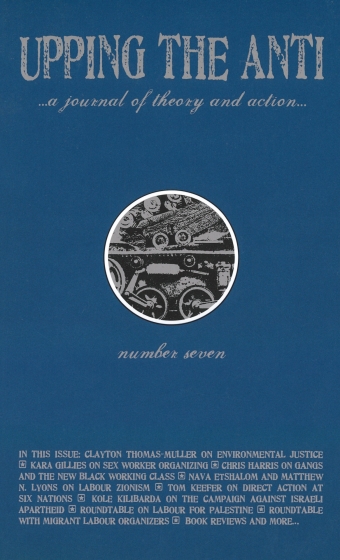The Need for Theory
Dear Editors,
I just read the latest issue of UTA cover to cover like I always seem to. Like earlier issues, #6 is moving in part because it reminds me of how badly we need to renew revolutionary theory and reconnect it with militant activism. The editorial, “In Praise of Good Maps,” is a very good defence of UTA’s hardscrabble journey toward that horizon. Unfortunately, there is no revolutionary theory in the issue at all.
Instead, there is the usual insightful left mix. David Calnitsky’s review of Naomi Klein’s “disaster capitalism” (The Shock Doctrine) is a pleasure to read. He takes her seriously instead of just applauding or dismissing her slap-down of the Bush Right as most?reviewers have done. Alexis Shotwell’s review of The Color of Violence is a good introduction for those interested in reading the book and, in some ways, is better than the anthology’s own introduction.
Unfortunately, the usual respectful interviews with revolutionaries from the 1960s and ’70s don’t live up to their potential. Although the interviews with Roxanne Dunbar-Ortiz and George Katsiaficas were both lively (and although the interviews are consistently the best part of UTA), the most important points often zipped by completely unexplored. For example, Dunbar-Ortiz mentions in passing how, in the 1960s, “a big weakness” was that “we were not kind to each other.” The interviewer should have asked her to be more concrete so that she could pass on lessons that we paid for dearly. Organizers from that era messed up because we were not able to create the sustainable beginnings of a revolutionary culture when the tide was turning. Unfortunately, the interviewer let the moment escape. Passively listening to Dunbar-Ortiz’s “how-vaguely-important-I-was” memories is not enough.
Even the siege at Wounded Knee passes without any discussion despite the fact that it was an important event for Dunbar-Ortiz. As her great road-trip autobiography of the Sixties recalls, in 1973 she was running from a physically abusive boyfriend and starting a job handing out change for slot machine players at a Reno casino. An indigenous co-worker told her that, on her rez, they were collecting supplies for the besieged American Indian Movement (AIM) fighters. Dunbar-Ortiz was reminded of her forgotten part-Indian heritage and began a new stage in her political life. But, as a subject for discussion, the siege at Wounded Knee passes so quickly because she didn’t do anything about it. Unlike what most young activists might assume today, there were no large campaigns to support that breakthrough native liberation struggle. If I remember correctly, the single largest support action was led by the Chicano movement. Corky Gonzales’ “Crusade For Justice” called out 500 people in a mostly Mexican/black march through the streets of Denver. In New York City, a support rally called by the Weather Underground and other anti-imperialists gathered only several hundred activists. (The Weather Underground also did a small protest bombing of a US Bureau of Indian Affairs office in South Dakota).
Although there was a whole lot of interest in that landmark struggle, the Left did surprisingly little to support it. In part, this was because of the very disorganized class nature of AIM. But it was also because of the US Left’s patronizing indifference to indigenous peoples and struggles. Although indigenous struggles were regarded as courageous and colourful, they were considered too marginal to be politically significant. Unlike the “big divisions” of the black movement, the anti-war struggles, and industrial unionism, indigenous struggles were seen as atypical. Consequently, we saw lots of sympathy but little political work. Left untended, weaknesses like these rarely solve themselves.
The phrase “air brushed” comes to mind when reading the Dunbar-Ortiz and Katsiaficas interviews. Bullshitting isn’t the same as sharing, no matter what you used to be. To be clear: the issue isn’t a bad grab bag for Canadian radical intellectuals. But a journal wanting to rebuild revolutionary theory has to at least engage in revolutionary theorizing. There’s a relationship between not searching out the underlying contradictions in mass practice and not searching for revolutionary theory. And while we need to avoid a return to the days of dogma and ideological straightjackets, we do need to take our collective search for new theoretical terrain more seriously.
At a time when the most significant economic crisis since the 1929 Depression is upon us, to have no discussion of anti-capitalist theories of capitalist crisis is strange. Now, in this crisis, large pogroms against Latino workers in the US are starting – even despite the disapproval of some capitalist sectors. The Right is scoring major victories on the ground and changing working-class reality even as everyone else just talks about it.
This isn’t just academic. Even a rough theoretical understanding of the crisis could help us to figure out our political direction. Almost a century ago, there was a major theoretical divide that gathered European liberals and social-reformists on one side and revolutionaries on the other. The reformists interpreted imperialism as an evil “policy” or “program” that was not integral to capitalism. They thought imperialism could be reversed by mass political pressure to restore capitalism to its “healthier” national scope. In contrast, European revolutionaries argued that imperialism wasn’t a strategy or policy but an entirely new stage of capitalist development in which finance capital converted entire nations into differing semi-classes in a new world order. This discussion remains highly relevant today, particularly as political forces from Iowa to the Ivory Coast beat the drums of rightist nationalism as the “people’s” solution to unemployment, recession, and their disintegrating societies.
As UTA has said, there is a need for theoretical “maps” to guide activists in these confused rightist nationalist wars over the collateral damages of globalization. True, it’s much harder to make things happen than it is to point out problems. But here we are, at the beginning.
In solidarity,
J. Sakai
Chicago, USA

